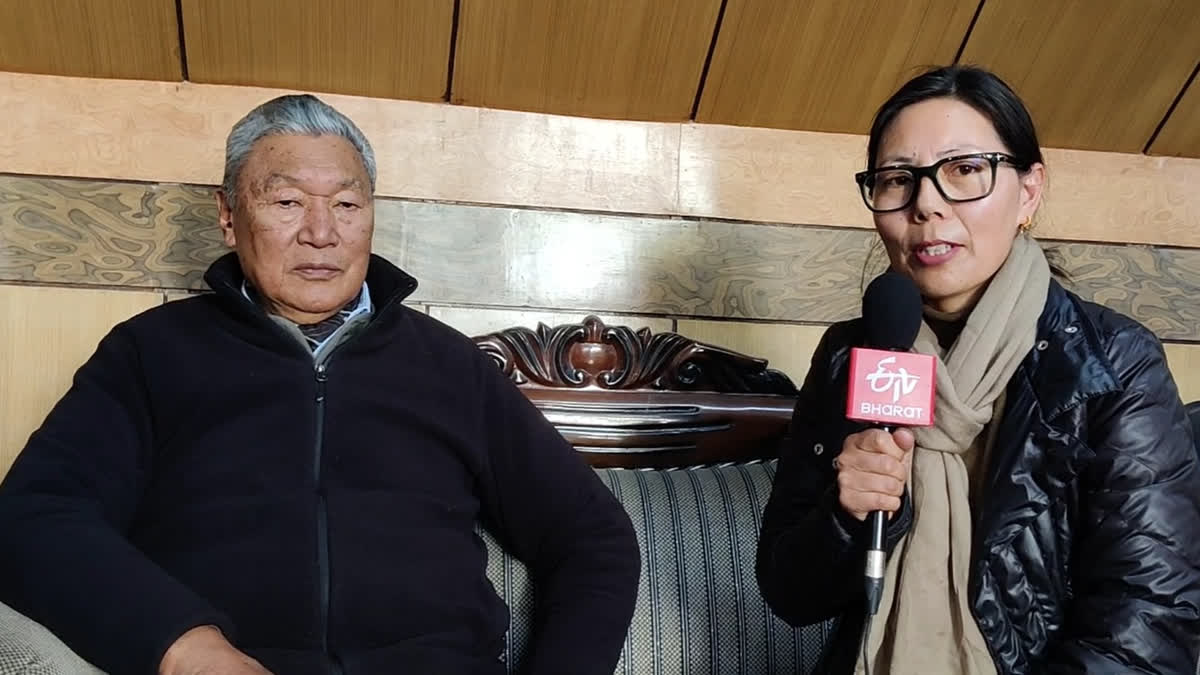Leh, Ladakh: Chering Dorjey Lakrook, Co-Chairman of the Leh Apex Body, discussed the outcomes of the High Power Committee's talks with the Ministry of Home Affairs (MHA) on January 15 in Delhi in an exclusive interview with ETV Bharat.
Focus on Employment
Chering Dorjey Lakrook stated, “Most of the discussions focused on employment, as the administration has not conducted any recruitment since Ladakh became a Union Territory. A detailed discussion was held regarding previously unclear recruitment policies. For instance, while the 95% reservation quota was understood earlier, the criteria for domicile were ambiguous. This time, clarity has been provided. Although the Leh Apex Body had proposed a 20-year domicile requirement, the proposal was made to set it at 15 years. As per this policy, a person, who has resided in Ladakh for 15 years after attaining UT status will be eligible to compete in recruitment examinations.”
Regarding the cadre, "We expressed our preference for Ladakh to have a separate cadre." He added, “ If that is not feasible, we suggested it could be clubbed with the Jammu and Kashmir Public Service Commission (JKPSC). However, we have categorically rejected the option of being included in the Delhi, Andaman and Nicobar Islands Civil Services (DANICS).”
Future of Hill Councils
Regarding the dissolution of the Hill Councils, there was no serious discussion on the matter. “However, the government raised the question of what would happen to the councils if Ladakh were granted statehood. We responded that the councils are not of primary importance to us, and even if they are dissolved, both Chief Executive Councillors (CECs) expressed no objections. If the councils are removed or dissolved, MLAs will replace them. In such a scenario, delimitation will take place, and the number of seats allocated to Ladakh will depend on the government. In my opinion, the minimum number of MLAs should be 30,” added Lakrook.
Speaking about the Notor land issue, he mentioned that it was not part of their agenda and was not discussed during the talks. He added, “However, the government has made an announcement regarding the Notor land issue in Ladakh where residential and commercial buildings cannot be constructed on such land earlier. Additionally, the registration of Notor land had been stopped, and now it has been removed altogether. The government has communicated these decisions to us.”
Regarding recruitment, he stated that departments that have finalised their recruitment rules may have their posts advertised soon. Initially, the focus will be on filling technical gazetted posts, such as engineers and doctors, which will be recruited through the UPSC.
Sixth Schedule and Statehood
Regarding the Sixth Schedule, he mentioned that there was no serious discussion on the matter. “The government indicated that implementing the Sixth Schedule would be challenging, but assured us that safeguards would be provided through alternative means. We conveyed our openness to this approach, but emphasised a key condition, if the government accepts our demand for a legislature, we are willing to discuss alternatives to the Sixth Schedule. However, if a legislature is not granted, we firmly insist on the implementation of the Sixth Schedule,” added Chering Dorjey Lakrook.
Speaking about the meeting, he stated that it proceeded as expected. He added, “While there were some points that lacked clarity earlier, this meeting provided greater clarity. Regarding the overage issue of candidates over the past six years, it was decided that a five-year age relaxation will be granted.”
He said, “In the upcoming talks, the cadre issue should be addressed, along with the key issues of the Sixth Schedule and statehood.”
When asked why it is taking so long to address the four-point agenda, he explained that detailed discussions require time. He recalled that during the negotiations for the Hill Council with the government, it took 5-6 years, from 1989 to 1995, to reach a resolution. He emphasized that people need to remain patient, as such matters cannot be resolved quickly.



